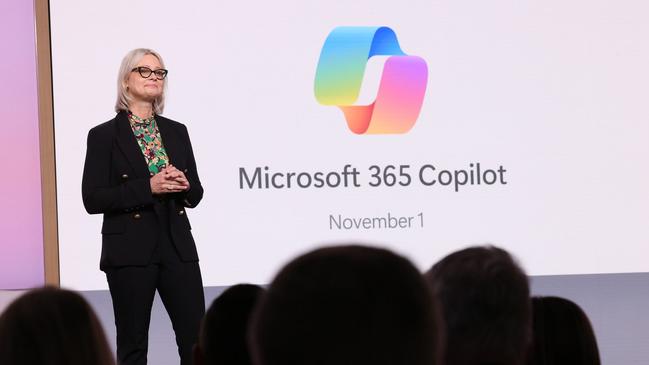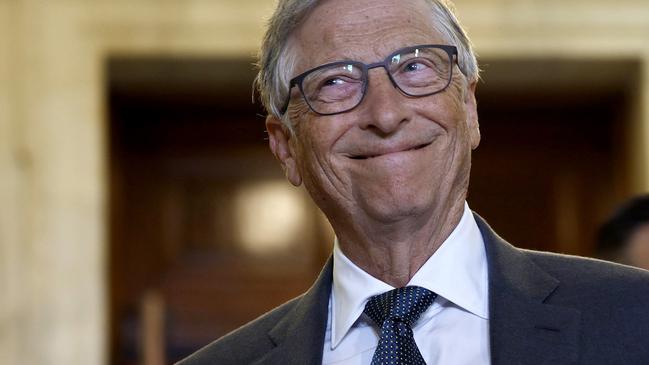‘At the speed of light’: meet the tech executive aiming to make workers smarter with AI
One of Microsoft’s most trusted lieutenants, spearheading one of the biggest workplace revolutions via AI, has moved to allay concerns of mass job losses.

Colette Stallbaumer - a Microsoft veteran of more than 18 years - says the company’s artificial intelligence platform is “usefully wrong” as she moves to allay concerns of mass job losses.
While it may sound like an oxymoron, Ms Stallbaumer has chosen her words carefully to highlight how humans are vital to the technology’s success.
The widespread adoption of artificial intelligence has become the biggest workplace changes since pandemic-enforced remote working. It has sparked concerns that machines will replace workers, with Goldman Sachs estimating that the equivalent of 300 million jobs globally could be exposed to automation as a result of advances in AI.
But Ms Stallbaumer - general manager of Microsoft 365 and future of work - says Microsoft’s Copilot platform is about making employees more productive, not redundant, saying human input and refinement was crucial.
“It’s usefully wrong, right? Like, I mean, it’s going to put you so much further ahead. It’s going to get you to good, so much faster. And then the human enters and decides how to get that from good to great,” Ms Stallbaumer said.
Using basic English commands, Copilot analyses a business’s own data - including documents, emails, calendars, chats, meetings, contacts and other information to generate a range of personalised content - automating routine but tedious tasks from formatting presentations and emails to speeding up research.
“It has a deep contextual understanding of you, your job, your priorities and your organisation. It’s like having someone attend all your meetings, even the ones you skip. Read all your emails, including the ones you missed. Know what’s in every single file and recall it all at the speed of light.
“I think that people, as humans, we want to create, we want to make the world better. We want to do stuff and get things done. That fundamental human need does not change. And so if technology can help people do what they uniquely can do, in any job, any industry, small business to large, that’s what makes me optimistic and excited about this new AI inflection point.
Ms Stallbaumer was speaking as Microsoft revealed a broader release date for its Copilot in New York overnight on Thursday.
To date, Microsoft’s 365 Copilot has only been available to a select group of businesses, including NAB, AGL, and Suncorp.
But from November 1, it will be available to all companies for $US30 per employee, per month. With millions of workers globally subscribed to Microsoft 365, it is set to make the company billions.
Microsoft chief executive Satya Nadella says Copilot will “fundamentally change” work, and as one of his most trusted lieutenants, Ms Stallbaumer, has been tasked with realising that vision.
It is a formidable challenge, involving a cultural shift among a fatigued workforce. According to a Microsoft survey based on 31,000 across 31 countries, 64 per cent of employees say they struggle finding the time and energy to get their work done.
About half of those workers are worried about AI taking their jobs, but 70 percent said they are willing to delegate as much as possible to some sort of AI assistant to help them perform their duties.

And this is how Ms Stallbaumer believes the Copilot platform can spark a workplace revolution. She said it had the potential to overcome digital overload - what has become the biggest productivity killer.
She said each week a worker is attending on average three times more meetings, receiving 250 emails and managing 150 chats since the pandemic began - sapping them from doing what they do best. But Copilot can help triage an employee’s attention.
“What our data shows is people are attending 60 minute meetings to get two minutes of insight or the two minutes of information that they need. But with Copilot you can extract that really important data or salient thing you‘re trying to catch up on or maybe that one data point in an hour-long discussion,” Ms Stallbaumer said.
It is just one of Copilot’s applications and works by allowing employees to question aspects of a meeting via written prompts after it has been recorded. But even when people are participating live and they feel a meeting is becoming longwinded, they can ask Copilot how to tactfully get the meeting back on track - with the platform providing a range of suggestions - helping an employee improve their interpersonal skills.
“The pendulum shift in what happened during the pandemic, where we had a hammer and nail and everything became a meeting. Right now I think there’s an opportunity with Copilot to help people find more focus,” Ms Stallbaumer said.
“We started with 20 customers, now we‘re up to 600 in our Early Access Program. overwhelmingly the conversations we’re having with them and what we’re learning from them and the leaders that I talk to every day - the CEOs and CIOs (chief information officers) - they are not talking about job replacement, they are talking about human augmentation, right? How do I help my people do what they can do better, right, faster, more efficiently.”
It comes as productivity in Australia has flatlined since 2018.
Former Reserve Bank governor Philip Lowe warned in late May that wages rises of 4 per cent were not consistent with low inflation.
Indeed, a lift in productivity growth to around the long-term average of by 1.25 per cent is needed to sustain 3.5-4 per cent wage rises without further fuelling inflation.
Artificial intelligence will be key to making this happen.
Goldman Sachs economists Joseph Briggs and Devesh Kodnanisaying said earlier this year that the technology’s widespread adoption could drive a 7 per cent - or about a $US7 trillion ($10.9 trillion) - increase in global GDP and lift productivity growth by 1.5 percentage points over a 10-year period.
“Despite significant uncertainty around the potential for generative AI, its ability to generate content that is indistinguishable from human-created output and to break down communication barriers between humans and machines reflects a major advancement with potentially large macroeconomic effects,” Mr Briggs and Mr Kodnanisaying wrote in a report.
But Copilot is not set to just shake-up the workplace.
Microsoft says that its Windows version of Copilot can become your “personal shopper”, using written prompts and photos to help people research and buy products, as well as plan trips, edit photos and videos and more.
For non-commercial users, Microsoft Copilot will be available as a free update to Windows 11 from September 26.
Jared Lynch travelled to New York as a guest of Microsoft.




To join the conversation, please log in. Don't have an account? Register
Join the conversation, you are commenting as Logout